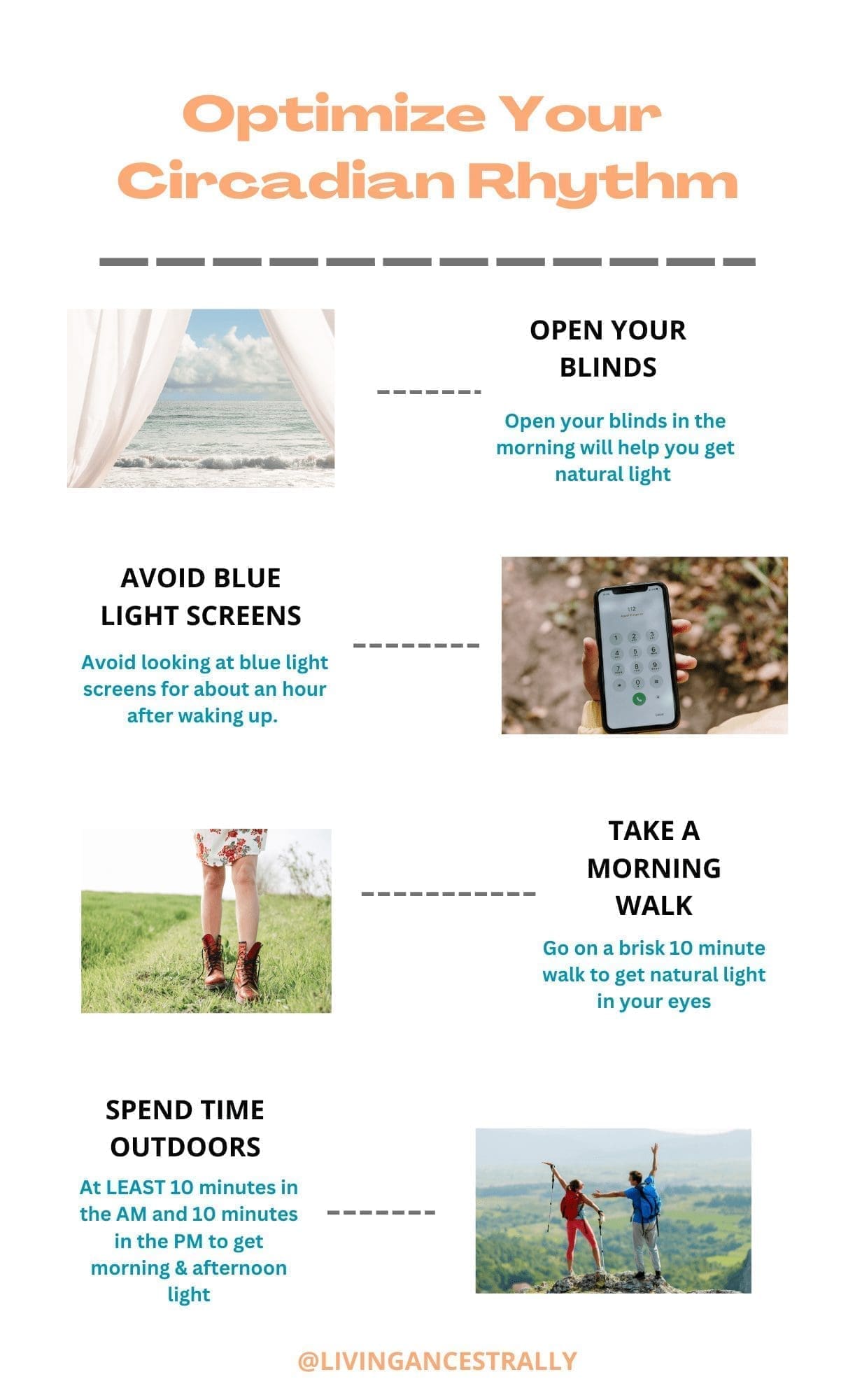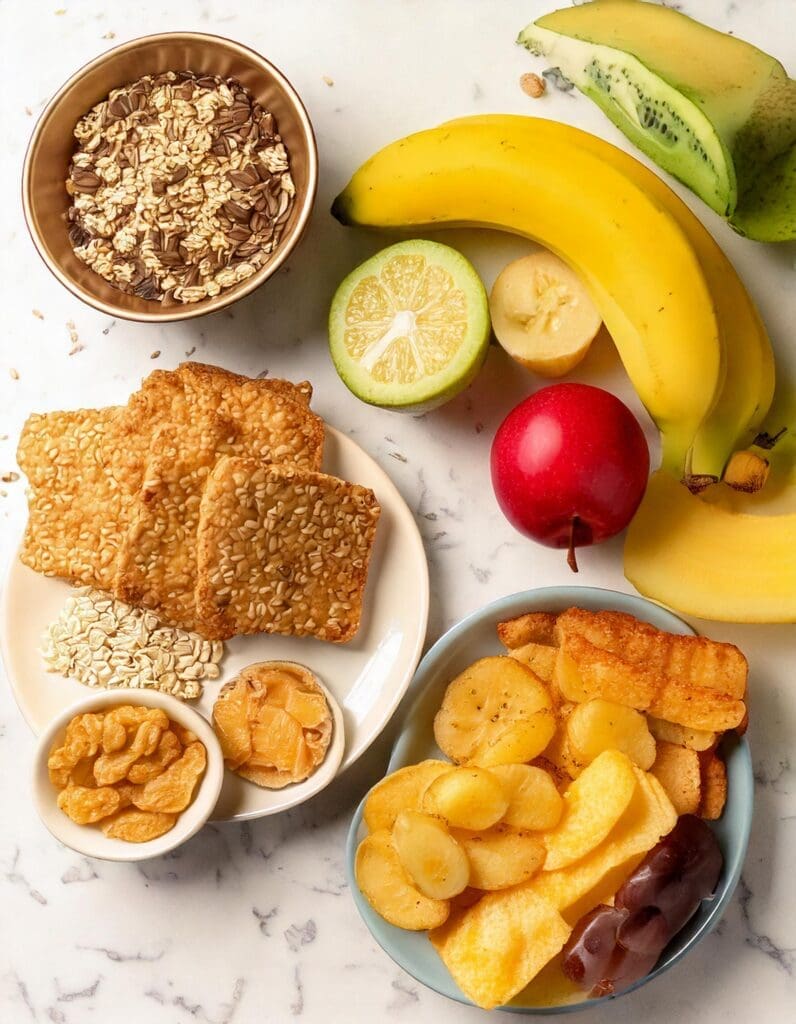Optimizing the Circadian Rhythm
Our circadian rhythm is a natural biological process that helps to regulate many of our bodily functions, including energy levels. This internal body clock has the power to determine when we feel most alert and energized throughout the day, as well as how well we can concentrate on tasks at hand.
By understanding the science behind this mechanism and taking steps to sync with nature, it’s possible to optimize your circadian rhythm for more sustained energy and productivity throughout the day.
In this article, we’ll take a closer look at what the circadian rhythm is and discuss ways you can get in tune with your own body’s rhythms.
What is the Circadian Rhythm and How Does It Work?
The circadian rhythm is a 24-hour cycle that controls the daily patterns of biological activity in our body, including heart rate, digestion, temperature regulation, and sleep-wake cycles. It’s an internal clock that is regulated by environmental cues like daylight and darkness. When this rhythm is disrupted we lack energy, our body isn’t able to do its important restorative work, and inflammation is the overall result.
Gaining an understanding of how our circadian rhythm works can help us optimize our daily lives for more sustained energy.
By making sure to get plenty of sunlight, minimize blue light exposure from screens at night, not eat too close to bedtime, eat a bioavailable mineral-rich diet, and get plenty of sleep, we can ensure that our body clocks are running at their optimum level. This will help us maintain sustained energy throughout the day and maximize productivity without sacrificing our health.
Furthermore, by learning from the practices of our ancestral people, we can gain valuable insight into how to best optimize our daily lives for more sustained energy.
With a bit of effort and knowledge, it is possible to unlock the full potential of our internal body clocks and enjoy better health and focus throughout each day. Let’s dive in and learn more about this extremely important topic!
The Circadian Rhythm of Ancestral People
Our ancestors had a much closer relationship with the natural rhythms of the day than we do today. They were attuned to the sunlight, animal behavior, and changes in the weather that signaled when it was time for rest, work, or play.
The circadian rhythm is believed to have evolved to help humans—and indeed animals—align their behavior with the cycles of light and darkness.
In fact, there is evidence that some of our ancestors would often sleep in two separate bouts, one during the night and another during the afternoon.
These were known as “siesta” periods and were practiced by many cultures around the world.
There is evidence that this two-bout sleep pattern can be beneficial for our health and energy levels, as it helps to break up the day and provide more sustained energy throughout. So, don’t fret if you feel the need for a quick nap nin the middle of the day! This appears to have been a biologically normal need.

Another important factor to keep in mind when considering the circadian rhythms of ancestral people is that they did not have the same stressors that we do today. Their bodies did not have to deal with the same amount or types of environmental toxins, blue light emitting devices, electromagnetic frequencies, sedentary jobs, or highly processed foods – all of which greatly impact our natural circadian rhythm.
The bottom line is that our lives are different nowadays; however, that doesn’t mean that we can’t modify our modern lives so that they more closely resemble ancestral people’s healthier lifestyle habits.
Practical Ways to Incorporate Natural Light into Your Daily Life
One of the most important steps you can take to help optimize your circadian rhythm is to incorporate natural light into your daily life. This will help reset your body clock, allowing you to maintain more sustained energy throughout the day. Here are a few practical ways to make natural light part of your routine:
✔️ Open Your Blinds 🪟: Opening your blinds in the morning will help you get natural light into your home or office. Keep them open for at least 15 minutes as soon as possible after waking up.
✔️ Avoid Looking at Blue Light Screens 📺: Put off looking at blue light screens for about an hour after waking up. This is a hard one for many people, but by doing so, you will allow your body to rely on natural light sources to more gently and naturally wake you up and increase your cortisol. If you must look at screens early in the morning then you can put red light filters on your devices.
✔️ Take a Morning Walk 🚶🏻: Going for a brisk 10-minute walk around the neighborhood is an excellent way to get some natural sunlight and give yourself a nice energy boost. This is important even on cloudy days. The effect is not as strong, but sunlight still travels through the clouds.
✔️ Spend Time Outdoors 🏔: Schedule some time each day to spend outdoors, preferably in the morning if possible. Even just 10-15 minutes can make a big difference in resetting your body clock and reviving your energy levels.
By following these simple strategies, as well as others, you can easily make natural light part of your routine and start to reap its many benefits, including more sustained energy levels throughout the day.

How Does Blue Light Affect Sleep?
Humans have circadian rhythms that are naturally aligned with the natural light-dark cycle of the day, but in modern times, this has been disrupted by artificial light sources.
Artificial light, such as the light produced by lamps, TVs, and computers, can interfere with our internal body clock and disrupt our sleep-wake cycle. This can lead to feelings of lethargy and fatigue during the day, as well as difficulty concentrating and focusing on tasks.
The good news is that you don’t need to let artificial light ruin your circadian rhythm. There are several simple steps you can take to optimize your body clock for more sustained energy throughout the day.
Here are a few strategies to decrease artificial light at night to help you sleep better:
- Red Light Filters for Screens – You can put red light filters on your smartphone, computer screen, and/or tablet. Doing so will decrease the blue light that is emitted from your device. We like Iris Tech. The process is simple: purchase the blue light-blocking software that the company has created and download it onto your device. From there, you simply choose the filter setting that you want.
- Blue-Light Blocking Glasses – Wear these a few hours before bed.
- Red Light Bulbs – Put these bulbs in lamps or sockets in your home. Use these lights at night.
- Blue Light Blocking Lamp – Instead of installing red light bulbs in your lamps, you can simply buy a red light lamp for nighttime use.
- Motion Senser Night Light – Plug this into your wall for when you get up to use the restroom at night. There’s no more need to use a blue light emitting night light that affects your ability to go back to sleep.
- Himalayan Salt Lamps – These lamps provide a low glow. You could buy a few of these lamps and scatter them around your house for nighttime use.
The Hormonal and Circadian Rhythm Connection
The circadian rhythm is largely driven by our body’s hormones, with the primary one being melatonin. Melatonin is produced in the pineal gland and released during the night to help us sleep, while its levels drop during daylight hours so that we can stay awake. This hormone works in conjunction with other hormones and neurotransmitters such as cortisol and serotonin to regulate our energy levels.
These hormones and neurotransmitters work together in a feedback loop, with melatonin levels increasing during the night promoting sleep, and cortisol levels rising during the day in response to sunlight exposure. This allows us to maintain alertness during the day while preparing for a restful sleep at night.
High Carbohydrate Foods Negatively Affect our Sleep-Wake Cycle
Carbohydrates have a profound effect on our blood sugar (AKA blood glucose) levels. Basically, all carbohydrates get broken down into glucose (a simple sugar). Yes, even “healthy carbs” such as sweet potatoes, carrots, oats, rice, and fruits. All of them break down into glucose. Simple carbs break down into sugar more quickly though than complex carbs do.
Blood glucose levels can have a major impact on our sleep. When blood glucose levels are high, our bodies produce more cortisol which can make it difficult to fall asleep and stay asleep. High blood glucose levels can also cause us to wake up frequently during the night, resulting in poor-quality sleep.
Eat Carbs Earlier in the Day
So, how can we time our carb intake in order to optimize our circadian rhythm?
Consuming carbohydrates during the most active time of the day (breakfast or lunch) is a good and natural strategy. Eating carbohydrates when you are more active will ensure that your body uses the energy from those foods more efficiently.
Carbs do provide a quick burst of energy thanks to the glucose that they contain. However, we don’t really need or want that energy spike close to bedtime.

Eating carbohydrates spikes our blood glucose levels. In response to that glucose spike, the hormone in our bodies that is known as insulin will spike in order to lower the glucose back down to normal levels. When choosing carbohydrates, reach for complex carbohydrates rather than simple carbohydrates.
Complex carbs have less of an impact on blood glucose levels. Of course, it’s highly advisable to completely avoid highly processed carbohydrates of any sort.
Another strategy you may want to consider is to have easily digestible sources of protein and/or higher-fat meals for your last meal of the day.
Protein and fat do not spike your blood glucose levels as carbohydrates do. They may increase your blood sugar levels somewhat, but not nearly as much as carbohydrates do.
Foods that Can Help Support a Healthy Circadian Rhythm
Eating certain foods at specific times of the day can help support a healthy circadian rhythm. For instance, not eating within 2-3 hours of bedtime has been shown to have a huge benefit for a healthy circadian rhythm.
Giving your stomach enough time to digest your food is ideal. Whereas, research shows that not eating within 4-5 hours of bedtime is even more optimal, when possible. If your body digests food normally, then that most likely gives the food you eat during your last meal time to leave your stomach and small intestine.
Here are a few more ideas for higher protein options for your last meal of the day:
✔️ Egg White Pudding
✔️ Egg White Bread
✔️ Light, Flaky Fish
✔️ White Meat Chicken (contains less fat than dark meat)
✔️ Collagen-Based Drink
✔️ Gelatin Gummies
✔️ Gelatin Pudding
✔️ Greek Yogurt
✔️ Kefir

In general, fat takes longer to digest than protein. So, it might not be the best thing to eat for some people before bed unless you’re only having a small amount of fat. Everyone is different though so be sure to experiment.
As already discussed, eating carbohydrates later in the day is not ideal for most people. Carbohydrates break down into sugar which boosts your blood sugar and insulin levels. This process may affect your sleep.
Plan to reach for higher protein, lower fat, and lower carbohydrate foods for your last meal of the day. Consider trying it out to see how you feel! Does your sleep improve once your body adjusts to the change? Observe and adjust as needed for your own needs.
Normalizing Your Internal Clock for Optimal Energy Levels
Our internal body clock is a powerful tool for optimizing our energy levels and productivity. By establishing regular habits that help keep our circadian rhythm in sync, such as exposing ourselves to natural light in the morning, avoiding artificial light at night, exercising earlier in the day, eating higher carbohydrate meals earlier in the day, and maintaining a consistent sleep schedule, we can better regulate our body clocks and reap the many benefits of sustained energy throughout the day.
Achieving a normal circadian rhythm is essential not only to naturally boost energy, but, also has a profound effect on balancing our hormones, neurotransmitters, minerals, healthy microbes, and various other bodily processes.
By making conscious lifestyle changes, we can take control of our internal clocks and enjoy optimal energy levels every single day.
We hope this article has been helpful in teaching you how to optimize your internal clock and maximize your energy levels. Remember, making small but consistent lifestyle changes can have a big impact on your well-being. Have fun setting up habits that support a healthy circadian rhythm and enjoy the benefits of sustained energy throughout the day!
This article is for informational purposes only and not intended to diagnose, treat, or cure any condition. Always consult your healthcare provider before starting anything new. Note that Hair Tissue Mineral Analysis (HTMA) is not a diagnostic tool and does not replace medical tests prescribed by your doctor.
